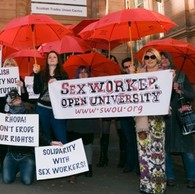|
On 28/02/17, the Huffington Post ran a blog piece by Heather Brunskell-Evans on "The contemporary 'cult of the 'sex-worker''". The article adopts an anti-sex worker stance, and broadly criticises changes in public opinion towards sex work as 'fashionable'. Brunskell-Evans also makes several aggressive attacks on a 2014 conference on feminism and sex work, organised by Erin Sanders-McDonagh and Lucy Neville and held at Middlesex University (Feminist Whores? Exploring Feminist Debates Around Violence, Sex Work and Pornography). Here, Lucy Neville and Erin Sanders-McDonagh address the accusations made in Brunskell-Evans' article. Dr Lucy Neville is Senior Lecturer-Criminology: Criminology Theory at Middlesex University (@blue_stocking ). Dr Erin Sanders-McDonagh is the Director of Studies for the Criminology Undergraduate Programmes in the School of Social Policy, Sociology and Social Research.at the University of Kent (@erinsandersmcd ).  As the organisers of the conference held at Middlesex University three years ago, we want to respond to some of the accusations levelled at us by Heather Brunskell-Evans in her recent blog post for the publication, 'The Contemporary ‘Cult Of The ‘Sex-Worker’. First and foremost, the event was organised to provide a space for the inclusion of sex worker voices. Too often these voices are marginalised in the debate around sex work, and instead we hear from the same privileged, middle-class, cis-gendered, white, female academics (like us, for example). Our event included activists and workers who we value and admire: Ava Caradonna from the X:Talk project, a sex worker-led workers co-operative which approaches language teaching as knowledge sharing between equals and regards the ability to communicate as a fundamental tool for sex workers to work in safer conditions, Catherine Stephens from the International Union of Sex Workers, and representatives from the English Collective of Prostitutes. We were aware that it is sometimes difficult to speak openly about the wider social and economic issues around sex work when there are people in positions of relative power who regard your line of work as “slavery”, and presumably you as a ‘slave’ (as Brunskell-Evans does), so we made every attempt to be as inclusive as possible. People who felt differently on the issue were not excluded from the event – they can, and did, attend, as Brunskell-Evans herself is testament to. However, the conference attempted to get to grips with the critical issues around sex work – safety, health, violence, vulnerability, poverty – and this involves NOT taking the perspective that abolition is the only ‘answer’ to a very complex and nuanced issue.  We would like to add that the images we displayed were meant to challenge. Of course an image (integral to the infamous The People vs. Larry Flynt case) of a naked woman being inserted into a meat grinder is not meant to be regarded as “playful” or “ironic”. The image – and others like it – were meant to provoke us into thinking about how we balance things like sexuality, freedom, choice, oppression etc. At no point did we, or any of the speakers, claim “an earlier type of feminism” is the real impediment to women’s sex equality. Instead we urged feminists, of all ‘types’, to come together to think about ways we can work to improve things in the name of gender parity. Likewise, we were interested in exploring how the term ‘whore’ is applied to women who exhibit sexual agency, as well as men, women, and transfolk who exchange sex for money – there was no sinister, patriarchal agenda here, simply a desire for open and active discussion. We agree with Brunskell-Evans that “’whore’ isn’t a term like ‘gay’ which homosexual men have given themselves in order to define their own identity”. We would argue that it is more like the re-appropriation, reclaiming, and re-tooling of terms like ‘queer’ or ‘fag’ – intended to belittle and wound, but offering possibilities for resistance. I recall we had an interesting discussion on the day about whether it was OK for non-sex working women to put claim to the word, coming from their position of privilege. If a sex worker tells me I have no right to call myself a whore, I’ll listen and learn. If Brunskell-Evans wants to tell me I don’t have that right, I’d like to ask her some more questions. Dr. Lucy Neville (Middlesex University) and Dr. Erin Sanders-McDonagh (University of Kent)
2 Comments
3/2/2017 11:42:17 pm
Yes! I'm so passionate about this subject. How on earth other women think they can decide what's best for them and insist they're being exploited with no nuance, without even listening to what they have to say, is absolutely infuriating!
Reply
3/25/2017 12:26:57 am
Rather than a 'cult', it seems that the developing willingness to understand sex work as work allows space for women to describe their experience. Rather than being viewed as 'broken', or 'morally corrupt' (both of which question the rationality of sex workers) the current debate uncovers agency & control. I support a conference that provides a platform to have an inclusive conversation about sex work. The only way to understand sex work is to listen to sex workers themselves. To leave an event like that, where face to face and human interaction allows genuine discussion, and use a platform of a media outlet to shout anti-sex worker opinion seems disingenuous.
Reply
Leave a Reply. |
Sex
|
 RSS Feed
RSS Feed